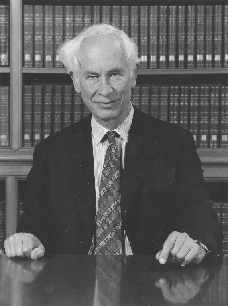Patrick Bateson facts for kids
Quick facts for kids
Patrick Bateson
|
|
|---|---|
 |
|
| Born |
Paul Patrick Gordon Bateson
31 March 1938 |
| Died | 1 August 2017 (aged 79) |
| Education | Westminster School |
| Alma mater | University of Cambridge (BA, PhD) |
| Known for | Bateson's cube |
| Scientific career | |
| Fields | Ethology Plasticity |
| Institutions | University of Cambridge Stanford University |
| Thesis | The Development of Filial and Avoidance behaviour in the domestic chicken (1963) |
| Doctoral advisor | Robert Hinde |
| Doctoral students | Mark H. Johnson |
| Influences | Niko Tinbergen |
Sir Patrick Bateson (born March 31, 1938 – died August 1, 2017) was an English biologist. He was very interested in how animals behave (this is called ethology). He also studied how living things can change their traits based on their environment. This is known as phenotypic plasticity.
Sir Patrick was a professor at the University of Cambridge. He also led the Zoological Society of London for ten years, from 2004 to 2014.
Contents
Learning and Studying
Patrick Bateson went to Westminster School when he was younger. Later, he studied at King's College, Cambridge. In 1960, he earned a degree in zoology, which is the study of animals.
He then earned a PhD degree. His research was all about how animals behave. His teacher for this research was Robert Hinde.
Career and Animal Behavior Research
Patrick Bateson was a biologist who focused on animal behavior. He explored how genes and the environment affect how animals act. He was a top expert on something called "imprinting" in birds.
Understanding Imprinting in Birds
Imprinting is when young birds learn to recognize their parents. They also learn to identify other birds of their own kind. Bateson's work helped us understand how this important learning process happens. His studies led to new ideas about how behavior develops.
He designed special experiments to show how imprinting works. These experiments proved that a bird's early experiences are very important. They shape how imprinting characteristics develop. His research on how birds learn also helped us understand how memory works in the brain.
Evolution and Animal Development
Bateson was also interested in how development and behavior affect evolution. Evolution is how living things change over many generations. He studied how the way an animal grows and acts can influence these changes.
Caring for Animals
Sir Patrick Bateson cared deeply about how animals are used in research. He thought a lot about whether animals feel pain or suffer. This led him to study how hunting affected red deer. He also looked into how dog breeding was done. He even reviewed how animals are used in scientific research.
Important Roles and Retirement
Before his retirement, Bateson held several important jobs. He was a Harkness Fellow at Stanford University in the USA. He also led the Animal Behaviour department at Cambridge for ten years.
He worked for the Royal Society as a biological secretary for five years. He was also the provost of King's College, Cambridge for fifteen years. He retired from both these roles in 2003. In 2005, he retired from his teaching position at Cambridge.
Key Publications
Bateson wrote many books and articles. His writings covered topics like ethology (animal behavior), animal welfare (caring for animals), and evolution.
- Growing Points in Ethology, with Robert Hinde (1976)
- Mate Choice (1983)
- The Development and Integration of Behaviour (1991)
- Assessment of Pain in Animals (1991)
- Measuring Behaviour, with Paul Martin (3rd edition 2007)
- Design For A Life, with Paul Martin (1999)
- Independent Inquiry into Dog Breeding (2010)
- Review of Research using Non-Human Primates (2011)
- Play, Playfulness, Creativity and Innovation, with Paul Martin (2013)
- Behaviour, Development and Evolution (2017)
Awards and Special Honors
Patrick Bateson was made a knight in 2003. This honor was for his great contributions to science. He also received an honorary degree from the University of St Andrews. He was given an Honorary Fellowship from Queen Mary University of London.
In 1983, he became a Fellow of the Royal Society (FRS). This is a very high honor for scientists in the UK. In 2014, he received the Frink Medal from the Zoological Society of London.
Personal Life
Patrick Bateson's family had other scientists too. His grandfather's cousin was William Bateson, a famous geneticist. Patrick's daughter, Melissa Bateson, is also a professor who studies animal behavior. She teaches at Newcastle University.
Patrick Bateson was an atheist. He passed away on August 1, 2017, when he was 79 years old.
 | Misty Copeland |
 | Raven Wilkinson |
 | Debra Austin |
 | Aesha Ash |

